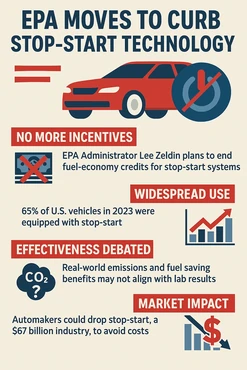The technology is 'hated' and doesn't accomplish anything, critics say
May 27, 2025
-
EPA to strip fuel economy credits from stop-start systems, calling the tech hated and minimally beneficial.
-
Automakers may phase out the feature, jeopardizing a $67 billion global industry.
-
Industry debates effectiveness, with real-world carbon savings lower than lab estimates but still significant.

The Environmental Protection Agency under President Donald Trump is taking direct aim at stop-start engine systems, a now-standard automotive feature originally adopted to reduce emissions and improve fuel economy.
Earlier this month, EPA Administrator Lee Zeldin announced the agencys intent to eliminate fuel-economy incentives tied to stop-start systems, calling the technology “universally hated” by drivers and of “questionable value” in cutting carbon emissions, Wards Auto reported. While the EPA cannot technically ban the systems, revoking fuel-economy credits would have the same effect potentially phasing them out as automakers chase cost savings.
Stop-start systems wear out starters, irritate drivers, and barely move the carbon needle, Zeldin said. Theres no reason taxpayers or regulators should be encouraging it.
Industry on edge: $67B in jeopardy
The announcement has rattled the global auto industry, where stop-start systems are worth an estimated $67 billion annually, according to IMARC Group. Major suppliers including Bosch, Denso, Hitachi, SEG Automotive, and Valeo now face uncertainty over whether automakers will continue ordering the tech.
Automakers adopted the systems starting in the early 2010s under pressure from the EPAs Corporate Average Fuel Economy (CAFE) standards, which offered bonus credits for vehicles with stop-start. The tech has since become ubiquitous in ICE vehicles equipped on 65% of U.S. cars in 2023, up from just 1% a decade prior.
But with no legal mandate for their inclusion, many automakers may now opt to eliminate stop-start systems to cut costs, especially as they grapple with rising tariffs and EV transition expenses.
Effectiveness: Real or overstated?
Supporters say stop-start technology has yielded real carbon reductions:
-
EPA data estimated 23 million metric tons of CO savings per year in the U.S.
-
In Europe, the feature has helped cut up to 20 million metric tons annually, per the EU and ACEA.
-
Globally, more than 50 million metric tons of CO emissions were avoided cumulatively by 2023, according to IHS Markit.
Yet critics say real-world performance often lags behind lab results. A 2017 study by the International Council on Clean Transportation found actual emissions savings were often 30%50% lower than regulatory tests suggest due to factors like infrequent activation in traffic, system deactivation by drivers, and climate limitations.
Do stop-start systems reduce carbon emissions? Its debatable, said Toyotas Cooper Ericksen, adding that Transportation Secretary Sean Duffy recently expressed frustration with the tech in his own pickup truck.
Consumer frustration meets regulatory reversal
Driver complaints from delayed engine restarts to poor performance in cold weather have dogged the technology for years. Many models offer a shutoff button, and reports show high rates of user deactivation, further undermining its effectiveness.
According to Consumer Reports, results vary by model. Some cars like the 2025 Chevy Equinox have been praised for smooth and quick re-engagement, while others suffer from jerky transitions and long delays.
Meanwhile, early adopters like Ford, which added the systems to all engines by 2015, acknowledged the need for more robust batteries and starters to handle the strain. Many industry insiders agree that the tech was a stopgap an inexpensive way to check regulatory boxes without full electrification.
The road ahead
If credits vanish, stop-start may go the way of the CD changer a once-common feature rendered obsolete by tech and public sentiment. And with the EPAs move echoing the administrations broader push to dismantle Obama-era climate regulations, the announcement signals yet another shift in the U.S. approach to emissions reduction.
#Trump #EPA #targets #car #stopstart #systems